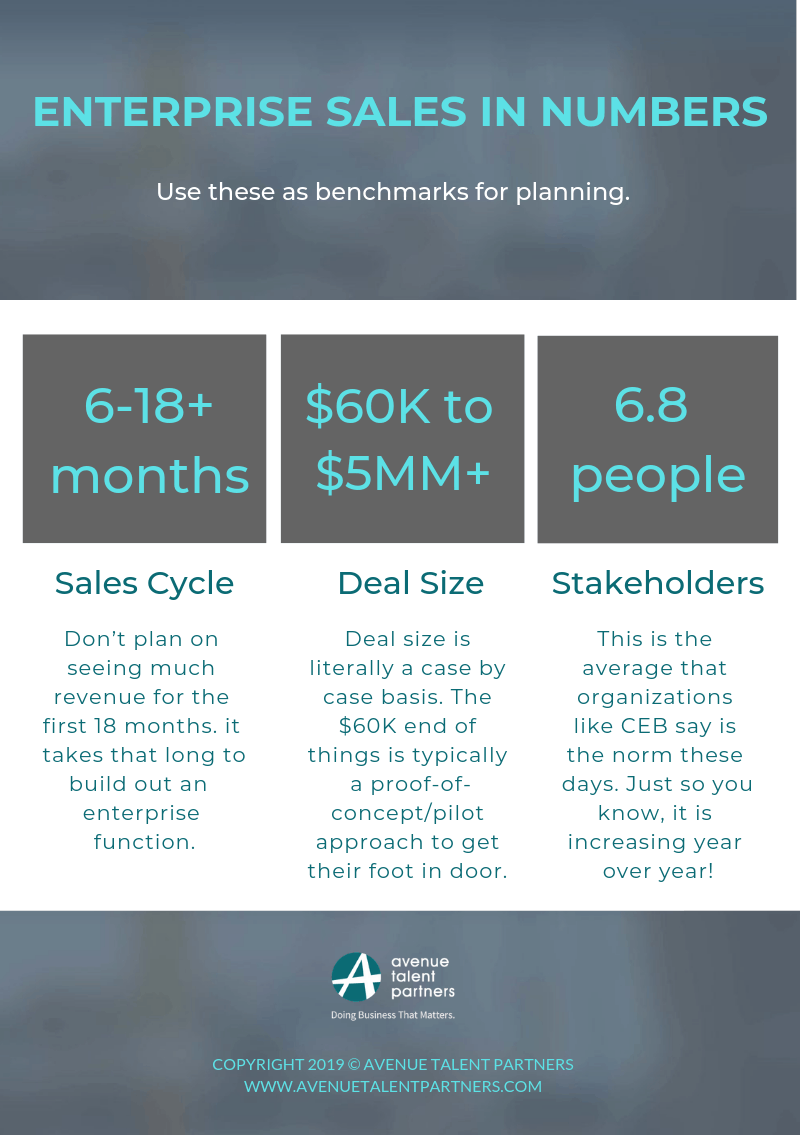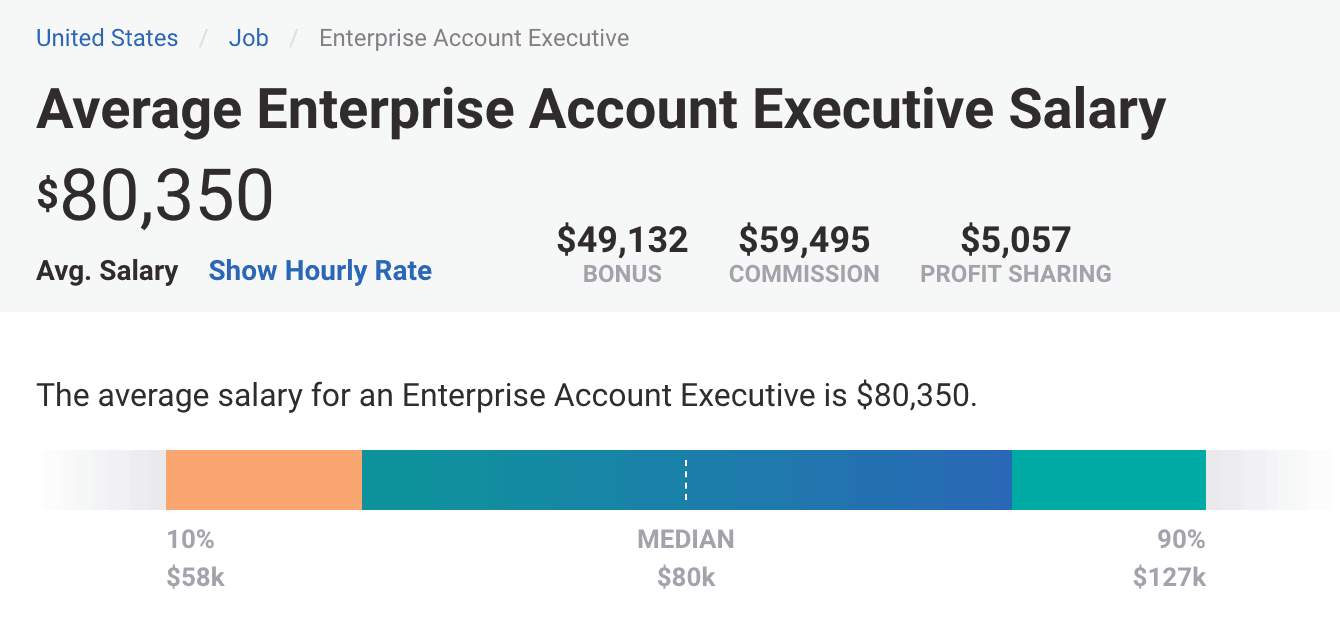
I got off the phone with a brilliant founder last night who has decided to “do enterprise sales” because she had experience working for a mega-brand and recognized a gap in the market as a result.
This process of arriving at or deciding to pursue enterprise sales is pretty common in the startup world.
However, I can say from first-hand experience that building the team you’re thinking of will be different than your expectations. And it will morph again when you have a few clients under your belt and continue to evolve as you get a foothold.
I’ve been fortunate to have the opportunity to both be part of and build my own enterprise sales teams throughout my career – and I continue to help others do this today through my recruiting firm.
Here are the three keys to success for the top-performing teams I’ve been on.
World-Class Sales Leadership
The first and most important part of building a world-class enterprise sales team is you as a leader.
I say this all the time, but it bears repeating here: “It always starts from the top down.” I’ve personally seen (and experienced) many businesses with huge potential in the enterprise market tank their efforts because the leadership didn’t have the right mindset.
And this mindset gap usually starts with the way they define enterprise sales. It’s not that they define it incorrectly…just insufficiently.
For instance, most will tell you to think about enterprise sales in terms of deal sizes, sales cycles, etc.:

These things are all part of it (and important for planning purposes). But they aren’t the whole story.
Great example – a former client of ours was doing $300k+ deals in four to six months. It doesn’t fit “the mold” but it’s still 100% enterprise sales.
And that’s because the thing that really makes an enterprise deal “enterprise” is the level of complexity and the mindset/approach required to execute it.
Enterprise deals are all about building a custom solution for an individual client – the opposite of small business (SMB) where it’s highly transactional in nature to quickly translate your existing product to as many buyers as possible. And in 20+ years, I’ve yet to see a product that was 100% ready off the shelf for an enterprise buyer.
So when startups (and startup leaders) fail to adopt this mindset, it affects everything, from the approach and process they take to the people they hire to execute it.
World-class teams and leaders always keep this need for customization at the center of everything they do.
Your Enterprise Sales Process
One of the most common misconceptions about the enterprise sales process is that what worked in the SMB world will work here. This simply isn’t true.
Most enterprise buyers aren’t looking for a solution. So if you come at them with a pitch or try to spray and pray with your prospecting efforts right out of the gates, you’re not going to get very far.
Instead, what they really need is for you to help them solve problems and achieve their goals. That’s why when it comes to your process, this quote from enterprise software entrepreneur and advisor Mark Birch is everything:
“Good salespeople sell lots of product, but great salespeople make lots of customers successful.”
– Mark Birch
Here’s how I do that in my own sales process, step by step.
1. Calculate Your Total Addressable Market (TAM)
This is exceptionally important and deserves an article all by itself. But to give you a high-level overview, there are three primary ways to calculate your TAM:
- Use industry research and reports that are available to you.
- Get out in the market yourself and seeing how it responds.
- Make educated guesses about a buyer’s willingness to pay.
Each of these has its merits. I prefer to use all three together to get the most accurate picture.
2. Prioritize Accounts That Are The Best Fit
The power of a pipeline is fierce in enterprise sales. This is a long game, so it’s important to prioritize your time accordingly with only the accounts that are the best fit. Be prepared to put a lot of irons in the fire all at once and test/refine over time.
3. Research Your Prospects
Once I have my prioritized list of key targets to go after, I set up alerts on Nudge to send me company and industry news for each prospect.
Here are some questions I ask myself to better understand their world:
- What’s happening in the marketplace?
- What challenges are they facing?
- What do Hoovers, DiscoverOrg, Owler, Crunchbase, Pitchbook, their annual report, etc. say about them?
- What does their roadmap look like?
4. Map Out The Organization & Engage Decision-Makers
Figure out who you think will be involved in the buying process, who your buyer will be, who your influencer will be, etc. Once you have a good feel for who those people are, it’s time to start engaging them.
5. Focus On Discovery
Enterprise buyers have competing priorities and are getting approached ALL the time. So once contact is made, you need to find new and different ways to add value to what they’re trying to achieve and stand out from the crowd and keep their attention.
That’s why asking great questions and doing thorough discovery throughout the deal is so important in enterprise deals – you won’t know how to add value if you aren’t.
Keep in mind, this is about co-creating the best solution together – not pitching. Look for the space in between that nobody else would pick up on and use that fill the gaps they have.
The better you do this, the more eager they will be to engage.
6. Land and expand.
Many enterprise sales functions will start with smaller, more approachable deals (like a pilot or a proof of concept trial) to reduce upfront risk and barriers to entry.
But while this is effective for getting your foot in the door, it often means that there is a ton of opportunity left out there with each buyer.
In fact, sometimes going from pilot to full-size deal can take five years.
Furthermore, you need to over-index on delivery if you want to hang onto what you worked so hard to get in the first place.
The best enterprise sellers know the hard work isn’t over once a contract is signed. There is often so much more opportunity for further growth that is left untapped through even further expansion of the solution you can provide.
Stay on top of changes in their marketplace and in their trajectory. Be that trusted confidant they can come to when they have questions or the proverbial @#!$ hits the fan.
Hire The Right Enterprise Salespeople
The final piece of the puzzle is getting the right people onboard (and continuing to support and enable them post-hire, but that’s a whole other ball of wax). And though this is part three, it might be the most important if you’re building a team out.
Here are four pieces that go into making a great enterprise sales hire.
1. Understand Who You Need & Why
The average sales turnover rate is now at 34%. And when you factor in that companies like Deloitte estimate turnover to cost 1.5x-2.0x of a person’s salary (plus how much enterprise salespeople cost – more on that in a sec) intentionality will serve you well when you’re ready to hire.
Most startups struggle to get their enterprise hires right because they don’t actually understand who the right hire is for their business. It depends heavily on how much selling you’ve already done, what stage your business is at, and more.
So before you start recruiting, make sure you understand what your buyers require to be successful, what you need as a result, who you need, how you’ll enable them, and why. Create/use a scorecard to take the emotion out of the hiring process while reducing your margin for error.
Whatever you do, DO NOT try to figure this out as you go – it will come through in the interview process and you’ll lose great people.
2. Look for the right skills and track record.
One of the biggest reasons people come to us at Avenue Talent Partners is to clean up after a mis-hire (something that is VERY expensive at the enterprise level). And 99% of the time it’s because they hired the person for the wrong reason – in many cases for a ‘playbook’ or Rolodex out of a big brand that just didn’t translate so well.
The reality is, these approaches rarely work – you won’t get a seat at the table like you do from a well-known household name, so you need someone who has the skills to sell without an established brand.
Furthermore, a strong enterprise sales hire should be well versed in everything above. If they don’t have the mindset I described in Part 1 or can’t walk you through how they do each step in Part 2 (plus the numbers to back it up), I’d be wary.
Finally, most enterprise sales cycles are a year or longer…so job-hopping is a red flag.
3. Focus On Candidate Experience
Top-performing enterprise salespeople will pay attention to how they are treated during the interview process a lot closer than your average candidate.
It’s an indication of what’s to come, just like the sales experience they create for buyers is indicates what being a customer will be like. Not to mention, top performers have an unbelievable amount of employment options to choose from (especially in today’s talent market).
So it’s essential you keep candidate experience a top priority throughout the interview process. Again, a scorecard will serve you well in this process.
4. Set your salary expectations correctly.
Sadly, most sites like Glassdoor will fill your mind with the wrong expectations on what you’ll need to budget when you’re ready to hire an enterprise salesperson.
Take this example from Payscale:

I can tell you from personal experience both as an enterprise account executive and from our own data as enterprise sales recruiters that the average salary you should expect to pay for a strong performer is closer to $129k.
Top performers cost every bit of $140k and up, though. So ensure you’ve budgeted correctly before you start recruiting.
Don’t try to “hack” this…
Far too many startups try to get around the cost of an enterprise salesperson by training up an SMB AE or hiring someone who calls themselves an “Enterprise Account Executive” but hasn’t done the work and is working for cheaper.
You truly get what you pay for when it comes to hiring people who are going to create the results you want. So don’t try to skimp here…you’ll just end up costing yourself more in the long run (not to mention the brand damage you’ll do with buyers).
A Word To The Wise
If you’re starting from square one, keep in mind that it takes at least 12-18 months to build a strong enterprise sales function. So before you embark on this journey, take a hard look at your runway/run rate.
Are you prepared to really go to market? Will you have the ability to customize? Most importantly, are you prepared to delight your clients so that you hang on to them once you get them?
Referrals are a critical part of building an enterprise sales function…don’t muck it up.
And as with any sales effort, my advice is the same – start small, build from there. Get one great hire (or better yet, do it yourself if you’re an early-stage founder) and dial in your process.
Only seek to scale up once you know what you have is repeatable. Trying to grow too quickly will only lead to mistakes in this market…and those are a lot harder to come back from with buyers like these.
Nail first, then scale.






